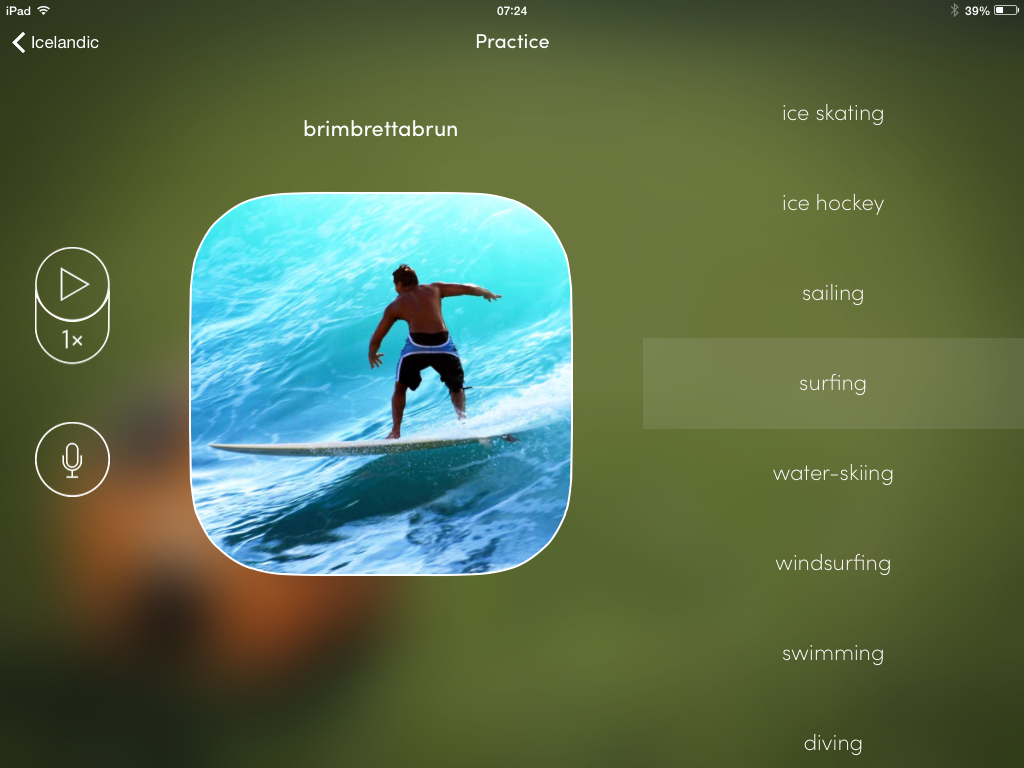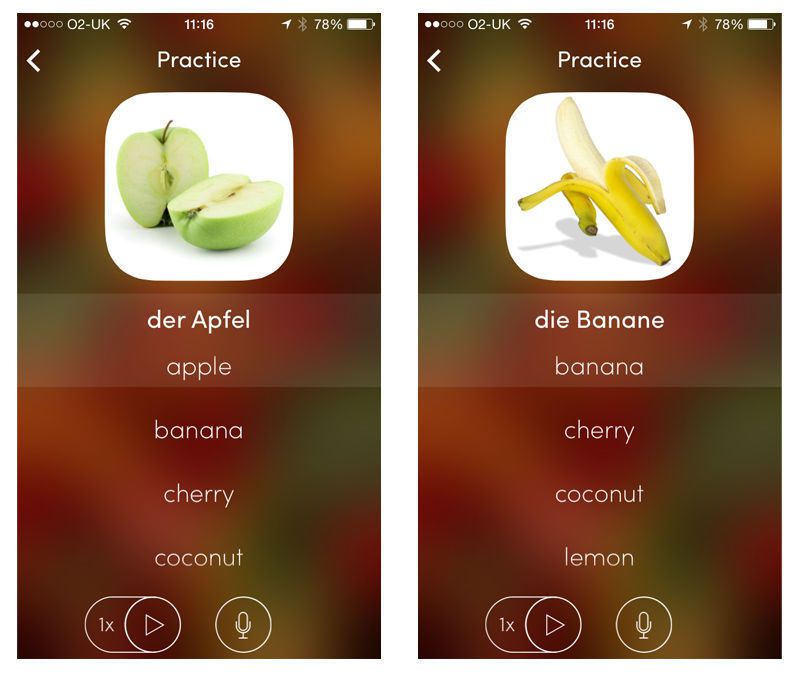Learning lots of Icelandic!
Góðan dag!
As you may remember, I’ve been learning Icelandic for the January uTalk Challenge. It’s a totally new language for me, with different rules and pronunciation to other languages I’ve studied, and I’ve absolutely fallen in love with it.
There are a few sounds in Icelandic which I really love. One of them, which I’m going to (unflatteringly) call the ‘spitty’ sound, is the sound made by a double ‘L’, as in the word for car (‘bíll’). It’s incredibly satisfying to replicate, although I can’t really explain why – just find an Icelandic person and ask them to say the word for car, or get uTalk and hear our lovely voice artists say it, and you’ll see what I mean.
There are also a few sounds which have just tied my tongue into knots. Although a surprising amount of Icelandic seems vaguely intuitive for an English native speaker, occasionally I’ll come across a preposterously long word boasting a collection of ‘eð’s and ‘þorn’s (the two ‘th’ letters), and it’s really been a case of memorising the words at this stage. It took me absolutely ages to master ‘hjúkrunarfræðingur’ (rather less manageable than English’s nice and simple ‘nurse’) and ‘afgreiðslumaður’ (‘shop assistant’). However, on most topics there have been several items I can make an intelligent guess at, either because they have some connection to the English (‘hjarta’- heart, ‘kókoshneta’- coconut, ‘baunir’- peas, ‘bjór’- beer) or because Icelandic is wonderfully logical at times: it doesn’t take too much imagination to see that ‘á bak við tréð’ indicates ‘behind the tree’, and ‘Ég er með tannpínu’ means ‘ I have (lit. I am with) toothache’. So I have had it slightly easier than some of my colleagues, who have been battling with languages completely unconnected to English.
My technique has been to cram as much in as quickly as possible, launching into the Hard Game first and then going back to Practice to check on what I got wrong. I’ve left all the Recall sections until I’ve completed the other games in all the sections, and then I’ve gone back and used it as a test of how much I remember. I’ve also been pointing to people and things all weekend and saying the word in Icelandic, and getting anyone I’m with to repeat the words back to me. I’ve found this really useful because it makes you assume a certain amount of teacher-like responsibility, so if I’m not 100% sure on what I’ve told them I’ll go back and double-check it. Also, if they repeat back anything nonsensical I realise I’ve probably pronounced it terribly in the first place, and need to revise it. So thank you to everyone who’s put up with me spouting random Icelandic words at them recently! What I now plan to do is to leave the Icelandic for a week and then to come back to it towards the end of January and do all the Recall sections again, and see how much I remember (hopefully a lot).
I’ll leave you with my favourite word so far, which is ‘surfing’ – again, just another really satisfying sound: ‘brimbrettabrun’:
 Is anyone else doing the uTalk challenge? How are you getting on?
Is anyone else doing the uTalk challenge? How are you getting on?
Nat
Learning German: a whole new world
So as you may remember, I recently decided to try and learn some German as part of the uTalk language challenge. It’s not a language I’ve ever studied before, and as much as I’m enjoying getting stuck in, it’s also proving quite a bit trickier than I expected.
First, the accent is quite difficult to master. Up to now, my language studies have focused on the Romance languages, particularly Spanish, with its soft, rolling ‘r’ sound and lovely, lilting quality. German is, in contrast, full of hard ‘d’s and ‘ch’s and is a very throaty language, whereas Spanish trips easily off the tongue. There’s a video that surfaces from time to time on the internet, about how everything sounds angry when you say it in German. I don’t necessarily agree with that, but it’s certainly a very different accent to the languages I’ve studied before and is taking a bit of getting used to. I’m pretty sure I’ve been speaking German with a Spanish accent some of the time, which is confusing to say the least.
Then there are the long words. This is actually one of my favourite things about German – the way you can express almost anything simply by sticking words together – but it’s also quite daunting for a learner. Nowhere is this more evident that in the numbers, which look slightly terrifying on first encounter. That said, the way they’re constructed is actually very logical (67, for instance, is ‘seven and sixty’), so they’re not quite as scary as they look. So far, this is my particular favourite – it looks like a tongue twister but still makes complete sense when you break it down into five and fifty:
Telling the time, on the other hand, is proving a bit of a killer. The main reason for this is that German approaches telling the time differently to English. So whereas here in the UK we say ‘half four’ to mean ‘half past four’, in Germany it means ‘half of the fourth hour‘ – or ‘half past three‘. And it gets better – if you want to say ‘twenty five past three’, it translates in German as ‘five to half four’. I’m sure this is perfectly logical to a German speaker, and I know other languages take the same approach, but it’s taking me a little while to adapt to it.
The other problem I’m having is learning the definite articles with nouns – how do you know when to use ‘der’, ‘die’ or ‘das’? Unlike Spanish, which has rules to help you at least take an educated guess at the article, German feels pretty arbitrary – and it doesn’t help that whereas most languages just have masculine and feminine nouns, German throws in a third one (neuter), just for fun. At the moment I’m just going with what ‘feels right’, with varying levels of success, so I think what I’ll need to do is learn every noun with its article, since there’s no other way of figuring it out. That shouldn’t take long…
I’m jumping in headfirst to the challenge, starting straight away with the games in uTalk to see how much I can work out on my own. Then I’m going back and running through the Practice section for each category to make sure I’ve understood everything correctly, and put meanings to words I may not be sure of. (I suppose it’s the equivalent of attempting a conversation with someone and then going away and looking up anything I didn’t understand in a dictionary.) The results are sometimes a bit messy, but I feel like I’m learning faster that way. I’m working through the categories one at a time, in order, but going back regularly to practise earlier ones and make sure I haven’t forgotten everything I’ve learnt. And I’m saving the Recall sections for later – that will be my final challenge and the ultimate test of how much I can remember!
Since I have a long journey to and from work, I’m making use of my time on the train to learn, and so far it’s not going too badly…
Who else is taking the uTalk challenge? How’s it going? Everyone learns differently, so we’d love to hear how you’re approaching the challenge.
And if you’d like to take part in the challenge, it’s not too late – just drop us an email to get involved!
Liz
The uTalk language challenge 2015
We’ve had a great response to the uTalk challenge, with people all over the world getting on board and committing to learning a new language for the new year. There’s still time to join in – we’ll be starting on January 1st, but even after that there’s no reason you can’t take part if you’d like to. It’s never a bad time to learn a language, so just drop us an email and let us know your name and chosen language (there are 100 to choose from) if you’d like to join in.
Here are a few more details on how it’s going to work:
1. First things first
The challenge is intended to be fun. As competitive as we may get between ourselves here in the office (and we will!), we don’t want to put any pressure on anyone. So if you do find the language is a bit more challenging than you expected, or you don’t have as much time as you thought you would, nothing bad will happen. We promise.
Secondly, more than anything this is a personal challenge. We do ask that everyone starts together on January 1st 2015, and we’ll be keeping you posted on how others are doing, but we’ll let you decide how you go about learning. You can tackle the topics and games in any order you like; there’s no set order. Maybe you could get some friends to join you and have your own private contest – or you may find that your main competition ends up being yourself!
A few people have asked why the challenge is only for iOS users. It’s nothing personal – it’s just because at the moment, the uTalk app is only available for iOS devices. We’re really sorry that we can’t offer this opportunity to everyone right now.
 2. What you’ll learn
2. What you’ll learn
The code we’ve sent to participants unlocks the Essentials upgrade, which contains eleven categories to learn. (If you haven’t yet received your Essentials code, please email us and let us know which language you’re waiting for.) There is a further upgrade – the Premium upgrade – but this isn’t part of the challenge, so you’re under no obligation to purchase it. However, should you wish to learn more later, as uTalk challenge participants, this upgrade will only cost you £4.99 instead of the usual £12.99, which we hope you’ll agree is a bit of a bargain.
(On a side note, the EuroTalk team are taking on the full Premium app for our challenge, so don’t be alarmed if our scores look a bit higher than everyone else’s…)
3. Keeping in touch
We’ll be keeping in touch with everyone by email at regular intervals throughout the month to let you know how we’re doing and check on your progress. If at any point you don’t want us to do this, because you’ve had to put the challenge aside for the time being, or you’d just rather be left alone to get on with it by yourself, let us know and we’ll take you off the list.
When we contact you, we’ll ask you to email us a screenshot showing your current score (this will appear at the bottom of the topic menu once you start collecting points). This is so we can verify the scores, but also because it’s the quickest and easiest way for you to send them to us. If you’re not sure how to do this, we’ll be happy to explain! We’ll also be posting updates on our own social media on how you’re all doing in different languages, but we promise not to use anyone’s name without prior permission.
4. Sharing your progress
But don’t feel you can only share your progress with us when we email you. We’d love to hear from you at any time, so you’re always welcome to tweet us (@EuroTalk), email us or write on our Facebook page to let us know how you’re getting on. We’re also on Instagram so if you’re sharing any photos from the challenge, please tag us: @uTalk_learnalanguage
We’re not the only ones who’ll want to know how you’re doing. From personal experience, we know that sharing your goal with friends and family is a great way to keep your motivation up when it starts to flag (which it probably will at some point – you’re only human, after all). You may even inspire them to join in too.
If you are talking about the uTalk challenge on social media, please use hashtag #NewYearNewuTalk to join the conversation.
5. Finally…
This is the first time we’ve done the uTalk challenge, so please bear with us if it doesn’t always go entirely smoothly! If it goes well, we’d like to make it an annual event, so if you have any suggestions at any point on how we could make it better in the future, we’d love to hear them. (We have lots of ideas already…)
Good luck, and if you have any questions now or during January, we’ll be happy to answer them.
Happy New Year – and Happy Learning!
Why I’m learning French in January
So you’ve heard about our January challenge. You haven’t?! Quick, you still have time, have a look here.
 So I thought I’d give you my reasons for learning French, you know, in case you need some inspiration. The main reason is because I’ll be going to Paris for New Year (woop woop) and I am basically getting into ‘French mode’ by listening to French songs, eating croissants, and I even bought a chic beret.
So I thought I’d give you my reasons for learning French, you know, in case you need some inspiration. The main reason is because I’ll be going to Paris for New Year (woop woop) and I am basically getting into ‘French mode’ by listening to French songs, eating croissants, and I even bought a chic beret.
As a kid, teenager and young adult I have been learning German and English, and although I think they are both brilliant languages, I have always felt that I want to have that nice, delicate French accent and sing along with Edith Piaf while putting on my winged eyeliner.
I’m expecting it to be quite similar to my native language, Romanian for numerous reasons among which are the facts that they are both romance languages and that for quite a long period of history, Romania looked up to the French politics, lifestyle and architecture so many words come from French language – really excited about it!
Come play with us, it’ll be fun! Choose a language and let us know!
Ioana
Why I’m learning Italian in January
So I’ve jumped on the bandwagon and I’m taking part in the New Year uTalk challenge too.
It took me a while to finally decide on Italian. I was going to attempt Arabic or Mandarin; however given the time frame of just one month, I thought the challenge would be too great for myself. However I will attempt either Arabic or Mandarin at some point next year, you can hold me to that!
So why Italian I hear you say? Well there are many reasons.
I often go skiing in Italy and it’s very different to skiing anywhere else in Europe, as not many people speak English. It can be quite a struggle sometimes, so hopefully by the end of January with my newfound Italian it should be a breeze.
Near the office there is an Italian delicatessen, which sells some seriously good food. When you enter they’re always talking to you in Italian, and as I speak none I feel slightly embarrassed that I can’t respond in their own language. My goal by the end of January is to be able to order my food in Italian, as well as have a conversation with the employees there.
My final reason is that there are many beautiful cities that I wish to visit over the next few years in Italy. Even though it is a given that I will do the ‘touristy’ things whilst I’m there, I would also like to think I may be able to go off the beaten track and find some true wonders hidden from the tourists. I also don’t want to be a typical tourist and ignore the locals; I want to be able to interact with them and get a real feel for the city.
So those are my reasons for learning Italian.
Anyone else going to join me?
Amy




